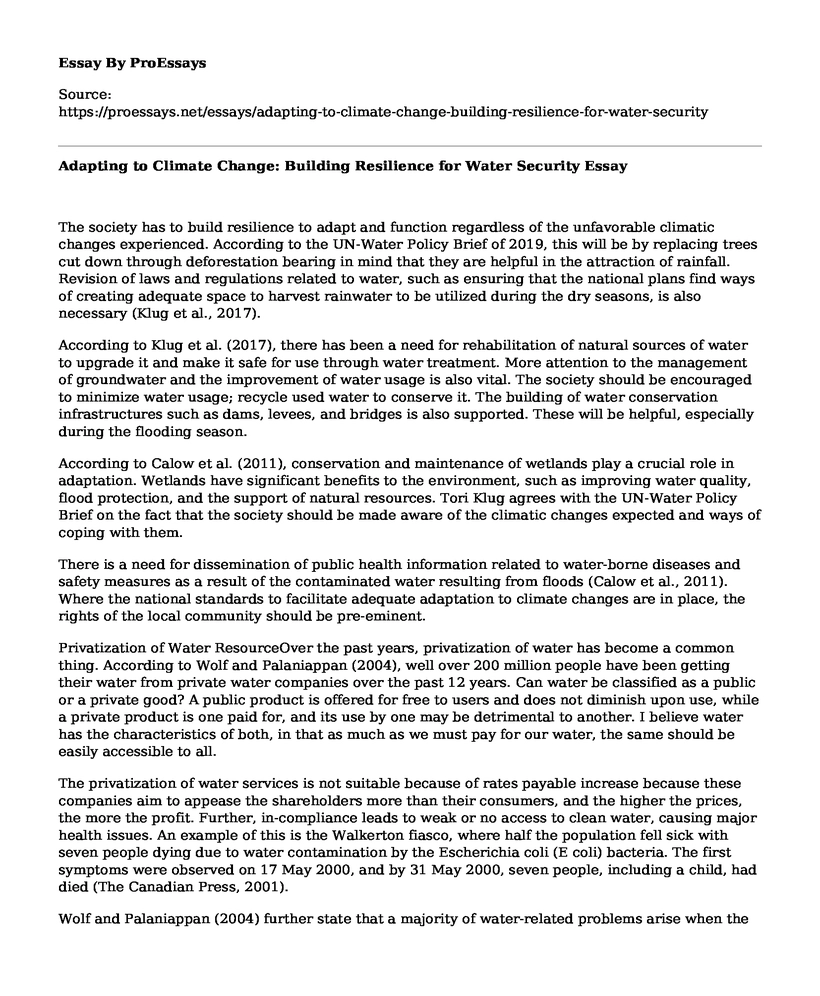The society has to build resilience to adapt and function regardless of the unfavorable climatic changes experienced. According to the UN-Water Policy Brief of 2019, this will be by replacing trees cut down through deforestation bearing in mind that they are helpful in the attraction of rainfall. Revision of laws and regulations related to water, such as ensuring that the national plans find ways of creating adequate space to harvest rainwater to be utilized during the dry seasons, is also necessary (Klug et al., 2017).
According to Klug et al. (2017), there has been a need for rehabilitation of natural sources of water to upgrade it and make it safe for use through water treatment. More attention to the management of groundwater and the improvement of water usage is also vital. The society should be encouraged to minimize water usage; recycle used water to conserve it. The building of water conservation infrastructures such as dams, levees, and bridges is also supported. These will be helpful, especially during the flooding season.
According to Calow et al. (2011), conservation and maintenance of wetlands play a crucial role in adaptation. Wetlands have significant benefits to the environment, such as improving water quality, flood protection, and the support of natural resources. Tori Klug agrees with the UN-Water Policy Brief on the fact that the society should be made aware of the climatic changes expected and ways of coping with them.
There is a need for dissemination of public health information related to water-borne diseases and safety measures as a result of the contaminated water resulting from floods (Calow et al., 2011). Where the national standards to facilitate adequate adaptation to climate changes are in place, the rights of the local community should be pre-eminent.
Privatization of Water ResourceOver the past years, privatization of water has become a common thing. According to Wolf and Palaniappan (2004), well over 200 million people have been getting their water from private water companies over the past 12 years. Can water be classified as a public or a private good? A public product is offered for free to users and does not diminish upon use, while a private product is one paid for, and its use by one may be detrimental to another. I believe water has the characteristics of both, in that as much as we must pay for our water, the same should be easily accessible to all.
The privatization of water services is not suitable because of rates payable increase because these companies aim to appease the shareholders more than their consumers, and the higher the prices, the more the profit. Further, in-compliance leads to weak or no access to clean water, causing major health issues. An example of this is the Walkerton fiasco, where half the population fell sick with seven people dying due to water contamination by the Escherichia coli (E coli) bacteria. The first symptoms were observed on 17 May 2000, and by 31 May 2000, seven people, including a child, had died (The Canadian Press, 2001).
Wolf and Palaniappan (2004) further state that a majority of water-related problems arise when the government fails to provide sufficient water or put in place stringent regulations on these private companies. Precaution should be observed as these problems strain the economy of the affected region; for example, the economic impact of the Walkerson fiasco estimated at $155 million (The Canadian Press, 2001).References
Calow, R., Bonsor, H., Jones, L., O'Meally, S., MacDonald, A., & Kaur, N. (2011). Climate change, water resources, and WASH: a scoping study. Overseas Development Institute.
https://www.odi.org/resources/docs/7322.pdfKlug, T., Shields, K. F., Cronk, R., Kelly, E., Behnke, N., Lee, K., & Bartram, J. (2017). Water systemhardware and management rehabilitation: Qualitative evidence from Ghana, Kenya, and Zambia. International journal of hygiene and environmental health, 220(3), 531-538.
https://www.sciencedirect.com/science/article/abs/pii/S1438463916303881 UN-Water launches Policy Brief on Climate Change and Water, 11 September 2019.
https://www.unwater.org/unwater-policy-brief-on-climate-change-and-water. "Walkerton Inquiry." Broadcast News. The Canadian Press. 8 May 2001. Retrieved from
HYPERLINK "https://www.cbc.ca/news/canada/inside-walkerton-canada-s-worst-ever-e-coli- contamination-1.887200" https://www.cbc.ca/news/canada/inside-walkerton-canada-s-worst-ever-e-coli- contamination-1.887200
Wolff, G. H., & Palaniappan, M. (2004). Public or private water management? Cutting the Gordian knot. Journal of Water Resources Planning and Management, 130(1), 1-3.) https://ascelibrary.org/doi/abs/10.1061/(ASCE)0733-9496(2004)130:1(1)
Cite this page
Adapting to Climate Change: Building Resilience for Water Security. (2023, Jun 07). Retrieved from https://proessays.net/essays/adapting-to-climate-change-building-resilience-for-water-security
If you are the original author of this essay and no longer wish to have it published on the ProEssays website, please click below to request its removal:
- Essay Sample on Effects of Disasters on Women, Children, and Elders
- Essay Example on Pursuing Your Dream Career: The Role of Passion and Pragmatism
- Maximize Time to Maximize Money - Essay Sample
- Essay on Technology Revolution: Enhancing Efficiency in Workplace
- Thomas Jefferson: A Life of Human Rights and Legacy
- Climate Change: Unprecedented Temperatures Predicted by 2100 - Essay Sample
- Paper Example on Motivation: Key to Automobile Business Success and Luxury Lives







